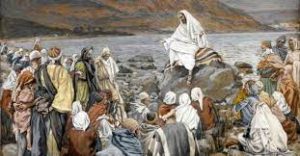HOMILY SUNDAY 06 – C
On Being Beatitude People
(Jeremiah 17:5-8; Psalm 1; 1 Cor 15:12, 16-20; Luke 6:20-26)
***********************************************************
There is a saying that life is a journey more than a destination.
To become Beatitude People, we must make the Beatitudes our way of life today.
At the beginning of his ministry, immediately after his baptism, Jesus was driven into the desert by the Holy Spirit to face three temptations: He was tempted to turn rocks into bread; to throw himself off the temple so angels could rescue him, and to bow down and worship Satan. These temptations can be summarized in three words: possessions, prestige and power.
We know that unlike the Israel of old that fell for those temptations time and time again (they always wanted Land, Temple and Kings), Jesus was totally faithful to God’s call to live a fully human life according to God’s will. As such, he said “no” to all three temptations.
 In today’s gospel, Jesus delivers what is seen as his Magna Carta inauguration address, the Sermon on the Plain (in Luke it is not a mount but a level field). In this sermon, we see him take up those temptations again in the form of woes, and his response in the form of the beatitudes. First the woes: Woe to the rich, those who think that possessions are the key to happiness; they will not inherit eternal life. Woe to those who are full now, who think that life is all about prestige and pleasure; they will eventually be left with emptiness. Woe to those who laugh now, who want only power and control; they too will be left with nothing in the end.
In today’s gospel, Jesus delivers what is seen as his Magna Carta inauguration address, the Sermon on the Plain (in Luke it is not a mount but a level field). In this sermon, we see him take up those temptations again in the form of woes, and his response in the form of the beatitudes. First the woes: Woe to the rich, those who think that possessions are the key to happiness; they will not inherit eternal life. Woe to those who are full now, who think that life is all about prestige and pleasure; they will eventually be left with emptiness. Woe to those who laugh now, who want only power and control; they too will be left with nothing in the end.
He wraps up the woes by identifying all these temptations, these false gods, as typical of the false prophets who misled people, who led them away from the path of faith and integrity. That state of existence Jeremiah describes so well in the first reading as those who turn away from God, who do not trust God, who trust only in their own mistaken ideas and futile agenda – they will be stunted in their growth and live barren lives in the end. As Fr. Ken Forster OMI states, “Wealth is a curse when it is not shared with those in need.”
Such is the case already especially in our Western world. In England it seems that parents are being discouraged from teaching morality and ethics to their kids because it would somehow affect their openness. This permissiveness in the name of progress has led to the highest rate of teenage pregnancy in the world. Yet in the Western World people are not having enough children to sustain the population. That is the desert that Jeremiah was talking about and it exists today.
The opposite path that Jesus highlights in the blessings of his sermon links with his response to the temptations. Blessed are the poor, those who know that material things, the rocks of the temptations, will never replace the kingdom of God. Blessed are the hungry, those who know that there is more to life than prestige and pleasure, they will be filled. Blessed are those who weep, who are not caught up in the game of seeking power and control, they will experience joy.
In the end, Jesus identifies all these qualities with the genuine prophets of Israel, basically saying that those who follow him are prophets in their own right. These are the people that Jeremiah speaks of as those who trust the Lord, who are full of peace and security, who experience no anxiety in times of drought. They will always bear fruit.
What consolation there is here for those who trust in the Lord with all their minds, spirits, strength and souls. They will already experience that eternal life that flows from the resurrection of Jesus to new life, as Paul so passionately proclaims in the second reading.
Jesus actually invites us not to become poor, but to become rich! “Blessed are you who are poor, for the kingdom of God is yours!” The poor possess a kingdom and they have it right now! Those who decide to enter this kingdom are from now on sons and daughters of God, free, brothers and sisters, full of hope and immortality. Who would not want to be poor in this way?
The Eucharist is a blessing to those who believe, a foretaste of the Kingdom that is already here yet still to come. May our celebration today help us to become the Beatitude people Jesus was calling into being as forerunners in his reign.
So, let us place our faith in Jesus, let our values be turned upside down, and live the Beatitudes as we experience the kingdom of God growing within us and within the community of followers of Jesus.



